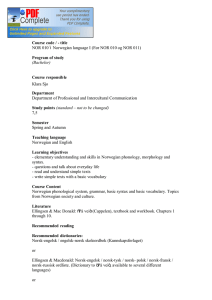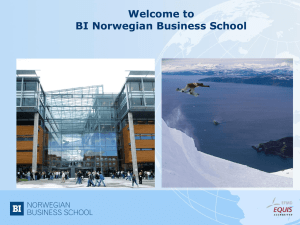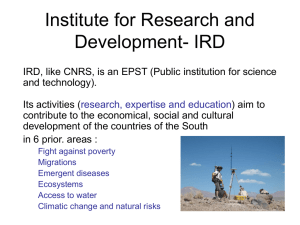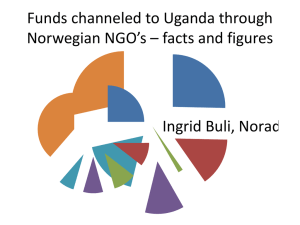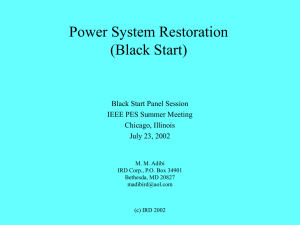Innovation Norway is committed to
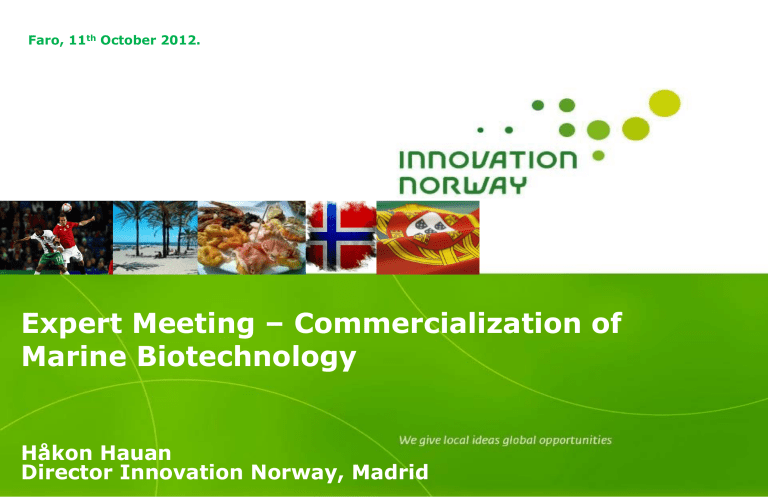
Faro, 11
th
October 2012.
Expert Meeting – Commercialization of
Marine Biotechnology
Håkon Hauan
Director Innovation Norway, Madrid
Industrial Research and Development Cooperation between
Norwegian and Foreign Companies
Innovation Norway is a government agency uniquely empowered to unleash entrepreneurship and cultivate a thriving culture of productive innovation.
This presentation highlights the purpose and scope of the financial program designed to foster Industrial Research and
Development (IRD) cooperation between
Norwegian and Foreign Companies
Guidelines for Foreign Companies acting as demanding customers
1. Introduction
This guideline is addressed to foreign companies interested in becoming the demanding customers of
Norwegian companies with new products or solutions not yet available on the market.
Innovation Norway offers a support program that makes grants available to
Norwegian companies, especially small and medium sized enterprises (SMEs) that are developing new products or services for foreign or other Norwegian companies. The support program may cover up to 60% of the development costs incurred by the Norwegian companies.
The support is based upon a contractual cooperation (IRD contract, see explanation below) where the foreign company acts as a demanding customer to the Norwegian company. The foreign company must have a need for the new product or solution and the Norwegian company must meet the requirements set forth by the foreign company. The product or solution to be developed should demonstrate a high level of innovation and represent a novelty in the market.
The cooperation must be a real partnership where both parties contribute with the resources and competence necessary to successfully carry out industrial development projects. To qualify for an IRD project, the project contribution of the demanding customer in terms of workload and funding must be at least 20% of the total eligible project costs.
In order to obtain an IRD contract supported by Innovation Norway, the foreign company should look for a Norwegian company with competence and ability to develop the products or solutions the foreign company seeks.
The benefits for foreign companies entering into IRD projects with
Norwegian SMEs are two-fold:
- significant reduction of project cost and financial risk
- opportunity to collaborate with Norwegian SMEs with unique skills and knowledge in the relevant product areas
Furthermore, if the foreign company is a supplier of defence equipment to the
Norwegian Armed Forces and has incurred offset obligations, contributions to
IRD projects may qualify as offsets if the product or technology to be developed is covered by the technology areas included in the Norwegian offset guidelines.
IRD contracts between foreign companies and Norwegian SMEs are
implemented as grants to the latter. The grants are calculated as a percentage of the project cost of the Norwegian SME.
There are no contractual relationships between Innovation Norway and foreign companies in connection with IRD projects.
The support program is called Industrial Research and Development
Program (IRD). It is a market and demand driven innovation program aimed at
Norwegian companies looking for opportunities to develop new products, processes or services for demanding customers, Norwegian or foreign.
In 2012 alone, Innovation Norway will spend about NOK 300 million on new IRD contracts.
2. Industrial Research and Development Contracts
An Industrial Research and Development Contract is a contractual agreement between a Norwegian company, preferably a SME, and a foreign or Norwegian company to collaborate on development of new “state-of-the-art” products, processes or services.
The partners in an IRD contract are:
• Supplier company - which should be a Norwegian SME (small or medium sized company)
• Client company (customer) - which may be either a foreign or Norwegian company
The role of the supplier company is to develop a new product or service
that the client company needs. The client company shall not only be a demanding customer but also participate in the project to enable the supplier company to develop the product or service that would satisfy the requirements of the client partner.
The IRD program provides support (cash grants) to Norwegian SMEs
(supplier companies) with the skills, abilities and capacity to solve development needs of a demanding customer.
To qualify for a grant, a project must represent an innovation in its business area and the end result must have a significant market potential beyond delivery to the client. Projects with either limited technology, product development or market prospects, will not be eligible for the IRD program.
The outcome of an IRD project may vary, but these results are typically:
A product or prototype as the first version of a unit that can either be marketed as a product in its own right or as a component of a larger system.
Software for which there is an independent business idea and that can be marketed as a separate product or service.
A system integration, with significant new capabilities.
A new production process .
Norwegian SMEs in any industry sector can apply to Innovation Norway for IRD support. However, Innovation Norway will give priority to business areas where
Norway is especially well placed to succeed. Important priority areas are offshore oil and gas, environment, maritime business development, as well as marine business development and energy. There is also a considerable focus on the health sector and other areas that involve large-scale public procurement, including industrial development linked to defence procurements and offsets.
3. Supplier Company (Applicant)
The supplier company is responsible for submitting the application to Innovation Norway for IRD support on behalf of the whole project. The grant is given to the
Norwegian supplier company to cover up to 45%, or if an
EEA bonus is applicable, up to 60% (see explanation below) of that company’s development cost.
Companies eligible for grants are normally Norwegian SMEs with the competence and ability to develop new products or services not currently available in the market.
• The Norwegian companies must fulfill the SME criteria as defined in the state aid regulations of the European Economic Area Agreement (EEA).
Norway is a signatory to the EEA Agreement
• The maximum amount of government support to companies is limited
according to the EEA Agreement - which applies the same state aid and public funding rules as in the EU.
• The European Union (EU) state aid rules define an SME as an enterprise having less than 250 employees.
• The EU applies three categories of enterprises: small, medium-sized and large.
• Small enterprises have fewer than 50 employees and an annual turnover or balance of no more than EUR 10 million. Medium-sized enterprises have 50-
250 employees and an annual turnover of no more than EUR 50 million, or a balance of no more than EUR 43 million. Large enterprises have more than
250 employees.
Size of supplier company
No. of employees
Max. annual turnover
Max balance
Small
Medium
Large
<50
50 - 250
>250
EUR 10 million
EUR 50 million
EUR 10 million
EUR 43 million
Support levels
Grants are calculated as a percentage of the project cost of the supplier company:
Size of supplier company
(no. of employees)
Small
<50
Medium
50 - 250
Large
>250
IRD projects
EEA bonus, 15% addition
45%
60%
35%
50%
25%
40%
As an exception , IRD grants may be given to a large supplier company if the project involves Norwegian SMEs and they benefit from sharing of competence, transfer of technology or new market opportunities.
An EEA bonus provision may increase the support level by 15 % if the project involves a collaboration between at least two independent companies of which at least one is a SME (< 250 employees) or the R&D-activities are carried out in at least two different EEA-countries. Moreover, to qualify for this EEA bonus, neither the supplier company nor the client company may incur more than 70% of the total eligible costs.
4. Demanding Customer
As a demanding customer to the supplier company, the client partner is expected to participate actively in the development project by contributing to the specifications, being an important reference client and strengthening the market potential for the product developed by the IRD project. This means for example access to new market channels and strategic partners.
The client partner must have sufficient resources (competence and financial) to manage its part of the IRD project.
Foreign suppliers of defence equipment to the Norwegian Armed Forces are well positioned to gain significant benefits as client partners in IRD projects.
When a defence contract exceeds NOK 50 million, foreign suppliers have to accept offset obligations. If they enter into IRD contracts as client partners, the investment they make in the IRD projects may be deducted from their offset obligations provided that the technology area of the project is included in the offset guidelines of the Norwegian Ministry of Defence (MoD).
The benefits will be two-fold:
1. Offset credits with factor up to 7,5 (subject to approval by the MoD)
2. Benefits accruing to client partners in IRD projects (as described in this guideline).
5. Duration of IRD projects
The IRD program can support development projects from the pre-study phase up to and including the industrial prototype/pre-commercial phase. It may also include testing and monitoring of whether the prototype meets specifications, including a 0-series production. This is in accordance with European Union (EU) regulations for research , development, and innovation.
5. Commercialization of the Products/Services from IRD Projects
The aim of the IRD program is not only to develop new products or services, but also to ensure that the product/service will be properly and professionally marketed. Consequently, it is of no interest to Innovation
Norway to support projects that do not have clear market objectives.
Market opportunities in addition to the business of the client partner is of great importance while considering support to IRD projects.
The supplier company is expected to submit a business plan that shows how marketing and sales will take place, including the resources and marketing expertise the company possesses. The client partner may contribute both as a marketing channel and as an important reference for the supplier, as illustrated in the figure:
Client company
Project
Supplier company
Market
Reference
Market
Also with respect to dependency between supplier and client partner we must follow national and EU-regulations
7. Independence –
Supplier and Client Partner
Normally, there is no mutual ownership between the supplier and the client company in IRD projects. It is acceptable, however, for the client company to control up to 25% of the share capital or voting rights of the supplier company.
Thank you for your attention
Concept: www.GATEWAYinnovation.com



